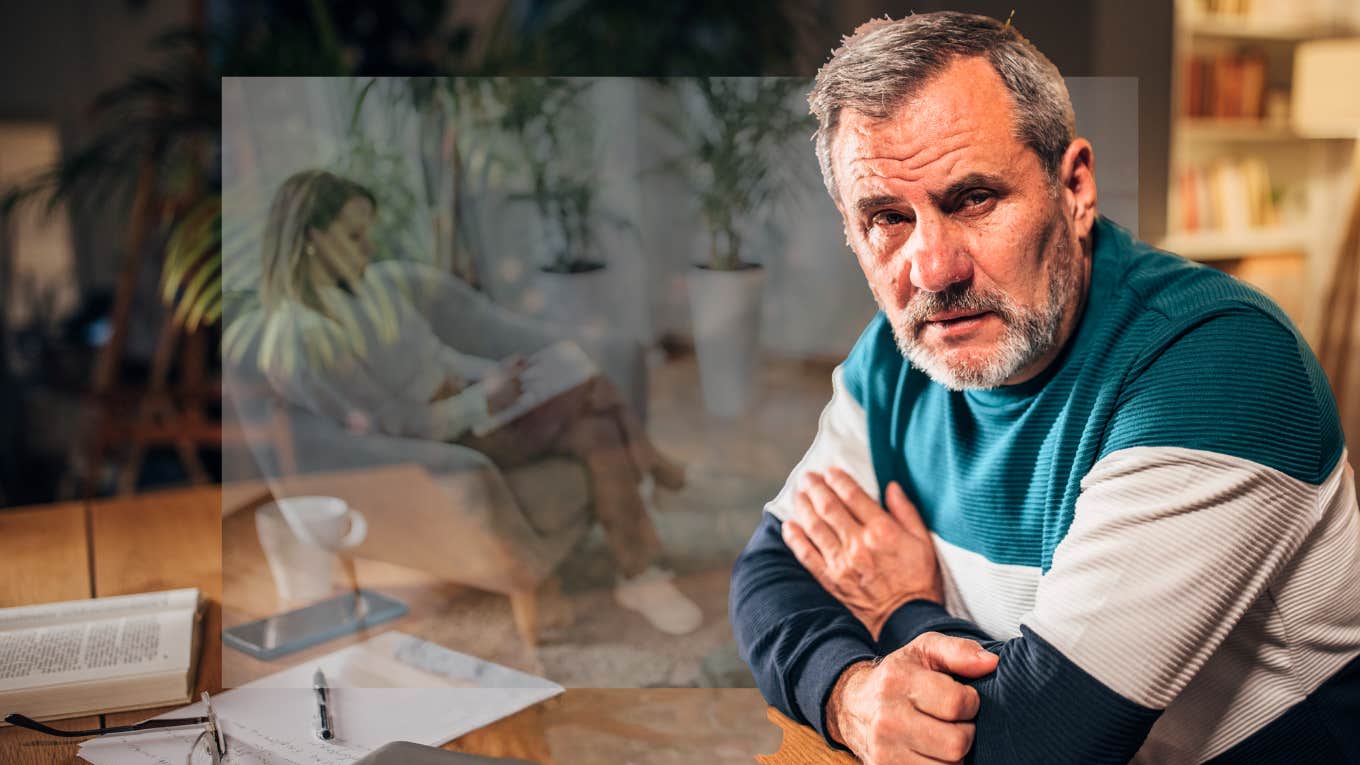A Well-Meaning Therapist Put Me In Imminent Danger With This One Phrase
Latching onto the wrong info extended my dark night of the soul.
 Nes | Canva
Nes | Canva Warning — this story contains discussions of severe suicidal ideation.
My partner Eddie begged me, begged me, to at least talk to a therapist. No thanks. I knew there was no point. I was done. Just done. I knew they couldn’t help. There was no talking through this.
It was COVID-19 days, November 2020 to be exact. Therapists had stopped seeing patients in person. Mental health resources were overwhelmed, backed up, and struggling.
In-patient mental health facilities had closed their doors and weren’t sure how to proceed. Securing a therapy session involved jumping through online hoops and forms, something a depressed and anxious person who hates technology doesn’t have patience for and doesn’t have any interest in.
In the lonely and isolated days of 2020, Eddie found himself suddenly stuck in a house with me, a pacing and anxious partner he didn’t recognize.
After a Thanksgiving night that found me on the National Suicide Hotline for the first time, then pacing all night, refusing to sleep — fun times, Happy Thanksgiving! — Eddie snagged a same-day appointment with my primary care doctor for some baseline anti-depression and anti-anxiety medications (something I didn’t want or believe in, but oh well). After some arm-twisting, he also snagged me my first appointment with a virtual therapist. I was skeptical but promised to try.
In our opening session, the therapist took down the vital details and then asked, “Are you on any medication for these issues?” Truth was I barely knew or cared what I’d been prescribed.
This was all new to me and I’d never been big on medication for anything. I looked at the bottles - “I’ve been on 50 milligrams of the generic Zoloft for a week.” Then I looked at the other plastic pill bottle. “Then, for anxiety, I’ve been prescribed .5 milligrams of Lorazepam, the generic of Ativan, to be taken as needed.”
The well-meaning therapist said the words I wish she hadn’t: “Oh, that can be horribly addictive.”
Boom — I latched onto that. And I stopped taking it.
Ah, proof! Another reason for me not to take this medication. In fact, “as needed” was extremely unclear to me, since this was my first rodeo with the not-fun combo of severe depression and anxiety from out of nowhere. I didn’t have a psychiatrist — I’d never had a psychiatrist — this was just prescribed as a band-aid by my primary care doctor.
The therapist had no way of knowing the severity of the situation. She didn’t know about the parking-garage top levels I’d climbed to, scoping out if I could be assured death with a jump… or if maybe I’d just cripple myself for life. She didn’t know of the late nights I’d spent searching the house for sharp implements, wondering, hmm, what’s the best method for a clean cut across the throat? What if I dropped this heavy brick onto my head?
It was that bad. These thoughts were only three weeks old but had overtaken my thinking with a driving, pulsating need to end it. They weren’t based on life circumstances, the loss of a job, a relationship, or a loved one.
It was just a takeover of my brain, personality, and self.
This situation absolutely required medication, probably a much higher dosage, and probably daily. Yes, addiction could very well be a side effect, but if this is a lifesaver medication that finally allows someone to think clearly for the first time in weeks, it might just need to be taken “as needed,” in this case, every day! Otherwise, death could be a side effect.
Before this, on the days Eddie had insisted I take the Lorazepam, I’d experienced a good 12 hours of normal thought — dare I say, I even had a personality and some hope. But then the next morning, the same feeling of dread greeted me as I witnessed the sky brightening for the morning.
Somehow the logical brain wasn’t allowed to break through, to say, “Hmm, you felt amazing after that medication yesterday, maybe you should keep taking it.” When you wake up with a negative brain, it wants to stay.
The medication worked when taken. I still certainly didn’t want to take it, but looking back now, I can see that it worked. Some depression was still there, but I could at least sound like myself, could feel and think like myself, and even locate my normal personality.
I wasn’t suicidal during those magical 12 hours when I was taking the medication my therapist had warned me about.
So here, on one of my non-medication days, a therapist was telling an already anxious person that the medication was horribly addictive, so I stopped taking it, and I didn’t improve. Four or five sessions later I told the therapist I didn’t want to continue the expensive sessions.
I am no mental health professional, so take this with a grain of salt, but I’m here to tell you, that if you’re suffering from both anxiety and depression, a deadly combo — deal with the anxiety first.
The anxiety medications have the power to work within hours, while the antidepressants can sometimes take a full four to six weeks to finally kick in. And that’s after you find the correct dosage if you find the correct dosage if you find the correct medication to start with.
Because of her words, I removed the anti-anxiety meds from the equation completely, and since the antidepressants weren’t yet at the correct dosage and hadn’t been in my system for the required weeks yet, it felt as if nothing was ever improving, nothing ever felt better.
If I’d taken the anti-anxiety meds every other day, or even every day, as needed, I would’ve saved myself the following five months of unnecessary struggle, of near-miss suicidal considerations that took over my mind.
Five full months later, after weeks of prying eyes actively watching me take my antidepressant medication and swallow it every morning, the clouds finally started to clear.
Sitting at my table, I mysteriously noticed one morning I was more interested in the world, it suddenly occurred to me — that I still have that bottle of Lorazepam that I stopped taking in December. Hmm, why haven’t I been taking that?
I took one dose — and proceeded to have my first fully-clear-headed, oh-my-personality-is-back day — the first in over five months. My beautiful Eddie wept tears of unexpected joy when I called him from hundreds of miles away to say, “Guess what? I think I’m getting better. I think I may be able to come home.”
The full six weeks had passed. The correct dosage of Zoloft had finally, finally kicked in. Though I was indeed still nervous about returning to the life I’d neglected — the life I’d never planned to return to — for the first time in seven months I could picture it, I was hopeful, and I was making small plans for the future.
This anti-medication fella couldn’t deny the power of these meds. The difference was pitch-black night and shiny-happy day, all in under 24 hours — which is freakin’ scary and mind-boggling and upsetting if you ponder it for too long. I guess the meds truly needed those six weeks at the correct dosage to fully snap in. They also needed a patient who was at least slightly compliant.
You’ll be surprised to know I don’t blame the therapist for what she said.
It was a first-time meeting, and most suicidal folks, unfortunately, very quickly learn not to mention how bad things are, lest there be steps taken — escalations and interventions that aren’t wanted. This was all new to me.
We had a perfect storm of a patient who hated the medical industry and medications, a global pandemic that exacerbated everything and made it impossible to get answers from live humans, and a patient who was afraid of the stigma of consulting with psychiatrists. Also, a patient who was so far into suicidal ideation by week two that he didn’t want to advocate for himself, didn’t want to improve.
Sure, my family demanded it and I’d have my little phone consult with some on-the-phone psychiatrist who kept playing with the dosages during those final months, but somehow the Lorazepam never came up in conversation again, no one asked me if I was taking it, no one was renewing prescriptions for it.
I’d succeeded in making them forget it too. The moment I heard, “Oh, that can be horribly addictive,” I shoved that out of my life, thus condemning myself to five extra months of anguish that were perhaps avoidable and unnecessary.
 Gustavo Fring | Pexels
Gustavo Fring | Pexels
Today, as I live a wonderful, newly-found life of fulfillment, I tremble a little when I realize how close I came to not making it back, how close I came to ending it all.
Deal with the anxiety first, folks. The right medication can at least take the unrealistic anxieties away so you can have the gift of a slightly more rational mind with which to confront the depression. I don’t blame her, but oh how I wish she’d just kept that one little thought and phrase to herself.
If you or somebody that you know is experiencing a mental health crisis, there is a way to get help. Call SAMHSA’s National Helpline at 1-800-662-HELP (4357) or text "HELLO" to 741741 to be connected with the Crisis Text Line.
Joe Guay of Dispatches From the Guay Life is a recovering people-pleaser now writing on Medium and other publications. A full-time voiceover actor aiming to also be the poor man’s David Sedaris, he writes on mental health, travel, showbiz, gay life, and surviving life through humor.

